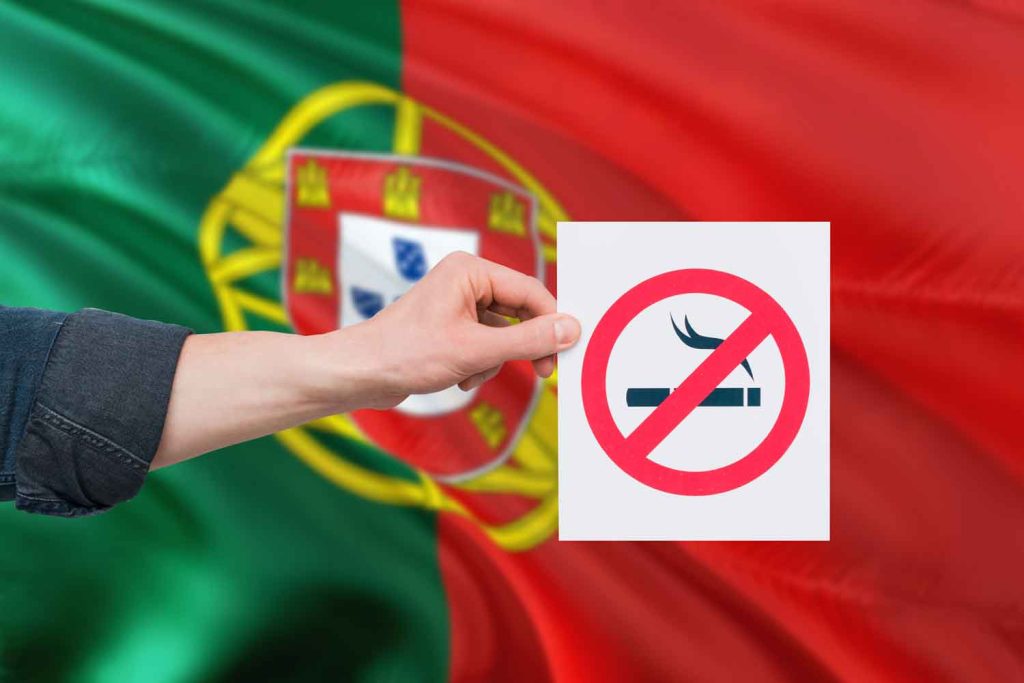Portugal is taking a firm stand against smoking and vaping with the introduction of a new legislation, which is aimed at restricting the use and sale of tobacco products.
The government’s ambitious bill includes measures to ban smoking in outdoor spaces adjacent to public buildings, such as schools, colleges, and hospitals.
That being said, the overall objective is to create a healthier and smoke-free environment for all of the country’s citizens. So, let’s take a closer look at what this could mean going forward.
What Are The Tightened Controls on Tobacco Products?
In addition to the outdoor smoking ban, the new legislation will significantly tighten control over the sale and marketing of cigarettes and other tobacco products throughout the country.
It is the goal that by 2025, these products will only be available for purchase in tobacconists, petrol stations, and airports, eliminating any future direct and vending machine sales in a variety of establishments, like restaurants, bars, concert halls, venues, casinos, fairs, exhibitions, and even music festivals.
This comprehensive approach aims to reduce the overall accessibility and also exposure to tobacco products in various public spaces, making those areas healthier for the general public using them.
Portugal to ban smoking in most places, restrict tobacco sales as it … – https://t.co/s9dp0a6DmMhttps://t.co/8Z3nEoWYJy
— THE WORLD NEWS (@news_type_c) May 11, 2023
Compliance with European Directive and Equal Treatment
Portugal’s efforts to restrict tobacco products also align with the European directive implemented on June 29, 2022.
The directive places heated tobacco, such as those used when vaping, on an equal footing with other tobacco products, ensuring that regulations cover all forms of tobacco consumption.
By treating heated tobacco similarly to traditional cigarettes, Portugal emphasises the growing need for comprehensive control measures to protect public health within their community.
Advantages and Potential Disadvantages of Restricting Tobacco Products
There are several advantages associated with the stringent restrictions on tobacco products in Portugal. First and foremost, these measures will contribute to improved public health outcomes by reducing exposure to second-hand smoke and potentially encouraging more smokers to quit or reduce their tobacco consumption.
Furthermore, by limiting the availability of tobacco products in public spaces, the legislation seeks to prevent young people from starting smoking and promote a future containing a smoke-free culture.
However, it is essential to consider potential disadvantages as well. Some critics argue that such restrictions may infringe upon individual freedoms and personal choices.
Additionally, there may be concerns about the effectiveness of these measures in curbing smoking and vaping, as individuals might resort to obtaining tobacco products through illegal means or turn to alternative nicotine delivery systems.
A Model for Other Countries to Follow
Portugal’s proactive approach in curbing tobacco use and vaping can serve as a model for other countries seeking to implement similar measures.
By combining comprehensive restrictions on smoking in outdoor spaces, tighter controls on sales and marketing, and compliance with European directives, Portugal demonstrates its commitment to public health.
Other nations can take inspiration from these initiatives and adapt them to their own contexts to both recognise and promote the potential benefits of reducing tobacco use and promoting a smoke-free environment.
Conclusion
Portugal’s new legislation represents a significant and much needed step forward in the battle against tobacco use and vaping.
By implementing strict measures to restrict the sale and use of tobacco products, the country aims to create a healthier society, while also complying with European directives.
While there are always potential disadvantages to consider, overall, Portugal’s approach provides mainly advantages, along with valuable insights for other countries seeking to adopt similar measures in the future.









